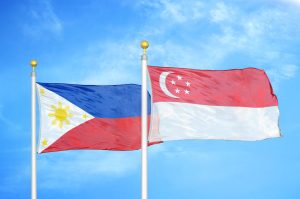The Philippines and Singapore signed a defense pact Wednesday that will allow their militaries to broaden their engagement, but few details were given about how the agreement could help address their security concerns in a region rife with conflicts.
Defense Secretary Gilberto Teodoro Jr. signed the memorandum of understanding with his counterpart in Singapore, Ng Eng Hen, in a ceremony that coincided with the anniversary of the establishment of diplomatic ties between the two countries.
The agreement, which was not immediately made public, “serves as a framework to guide existing interactions and promote cooperation in areas of mutual interest such as military education and anti-terrorism,” Singapore’s Defense Ministry said in a brief statement.
It aims to “foster closer people-to-people links” and builds on an existing agreement on education, training aid and support activities for humanitarian assistance and disaster relief, the ministry added, without elaborating.
A Singaporean and two Philippine officials said the agreement is not a so-called status-of-forces agreement that the Philippines has signed with three countries, including the United States, which allows large-scale joint combat exercises.
It could allow joint but limited drills such as “tabletop exercises” simulating responses to humanitarian crises and natural disasters with agreed terms of engagement, according to the officials, who spoke on condition of anonymity because they were not authorized to discuss the matter publicly.
Philippine President Ferdinand Marcos Jr.’s administration has taken steps to forge new security alliances with a number of Asian and Western countries and allowed a U.S. military presence at more Philippine bases under a 2014 defense pact since territorial hostilities between China and the Philippines surged last year at two hotly disputed shoals in the South China Sea.
China has said such alliance-building and actions by the U.S. and its allies, including the Philippines, are provocative, aimed at containing Beijing and endangering regional security.
Teodoro has bristled at such Chinese criticism. He said in a speech in May that “terming these cooperative activities with like-minded nations as a containment or a provocation is disinformation and evidence of paranoia of a closed political system.”
In his state of the nation address before the Philippine Congress on Monday, Marcos stressed that his country would not back down in the territorial disputes but stressed his administration would only use peaceful means to resolve any dispute and would continue building security alliances with friendly countries.
“In the face of challenges to our territorial sovereignty, we will assert our rights and interests in the same fair and pacific way that we have always done,” Marcos said, adding that efforts were continuing “to strengthen our defense posture, both through developing self-reliance and through partnerships with like-minded states.”
Earlier this month, the Philippines and Japan signed a defense pact named the Reciprocal Access Agreement allowing the deployment of their forces in each other’s territory for joint military exercises as both countries face an increasingly assertive China.
Japan and the Philippines have separate maritime territorial disputes with China.
The agreement will take effect after the Philippine and Japanese legislatures ratify it.
The Philippines is holding separate talks with Canada, New Zealand and France on similar defense agreements, the two Philippine officials said.
Japan and the Philippines are treaty allies of the United States. Their leaders held three-way talks in April at the White House, where President Joe Biden renewed Washington’s “ironclad” commitment to defend them.

































